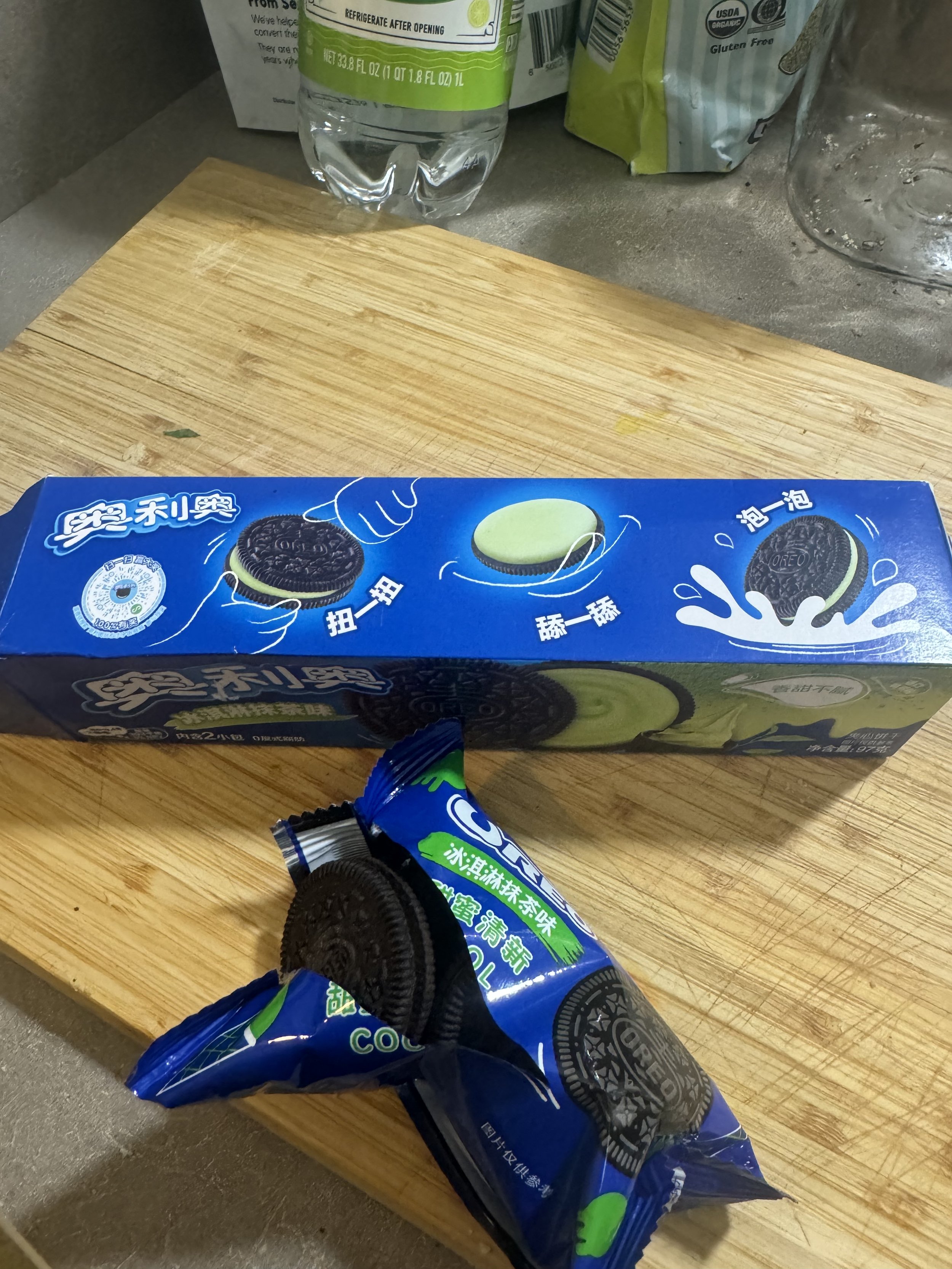Matcha Oreos and divinity; the 2024 presidential race and tears of joy; Charles Dickens and urchin chic.
I’m All Lost in…
the 3 things I’m obsessing about THIS week.
#43
I had quite the list of obsessions to choose from for this week’s report; I keep a running account in my notes app and here’s what it looked like by Wednesday night:
1. Dickens Ch 8
2. Prince’s Kiss on piano
3. Olympics women’s tennis
4. Shapiro (kill myself)
5. Matcha Oreos
6. Esperanza Spalding at Benaroya Hall
7. Fugazi doc at Grand Illusion
So…
1) My friend XDX left on her trip to China a couple of weeks ago with one suitcase. She returned this week with two.
The second suitcase was filled with gifts for friends and family, including a triptych of treats for me: Black sesame chews; Sesame fig balls; and Matcha-flavored Oreos. (She also got me a cool woodblock facsimile print of the Beijing street grid.)
While I certainly expected the matcha Oreos, with their light-green filling, to be tasty, I did not expect such divinity.
The matcha spread, flecked with cocoa, presented the perfect median between matcha tea’s grassy earthiness and Nabisco’s malted sweetness. Couple that with the signature dark chocolate snap of the bookend wafers, and I ended up eating the entire first sleeve of six Oreos in one voracious rush.
Unfortunately, the box came with just two sleeves total. And, it turns out, they don’t sell matcha Oreos in U.S. stores; believe me, after quickly devouring the second sleeve, I went online to check where I could get more.
I found some on e-bay, but that seems risky.
I did drift over to H Mart’s M2M store on Broadway, hoping for some cosmic tear in the supply chain continuum. But nope, no matcha Oreos.
This is probably a good thing.
2) I was hyperventilating with relief and crying tears of joy in my kitchen early Tuesday morning after my Democratic pal Annie texted at 6:15 with word that Kamala Harris picked Minnesota Governor Tim Walz and not Pennsylvania Governor Josh Shapiro as the Democrats’ VP candidate.
I had woken up at 3:15 with my heart in my throat convinced—as I’ve been for weeks—that Harris would pick Shapiro, thus condemning me to two months of yet more antisemitism and yet more condescending, tone-deaf editorials (or Tiktok hot takes) about antisemitism.
Worse, if Harris had picked Shapiro, it would have tanked the Democrats’ sudden momentum. Should I tell you about the concert I went to on Sunday night at Benaroya Hall where jazz bassist and art song diva Esperanza Spalding unfurled a Palestinian flag to the breathless glee of the white, NPR Democratic base in the audience?
The fact that I was having paroxysms of relief in my kitchen Tuesday morning clued me in to just how wound up I’d been for weeks. So, I took the day off to chill; though what I really did was revel (and obsess) over every NYT dispatch from the campaign trail where the Democratic energy (that I’d been certain was about to go poof with Shapiro) went into the stratosphere instead with America’s high school teacher/dad/football coach/GSA sponsor/vet/goofasaurus, Tim Walz.
Fittingly (and coincidentally), I had been practicing the song “Kiss” by Minneapolis legend Prince all week on piano. So, in honor of Gov. Walz I also spent some of my PTO day bashing out a few celebratory versions of that.
I ended up hanging out with my Dem pal Annie that evening. We light railed to the Grand Illusion in the U. District to watch a documentary featuring found concert footage of cerebral punk band Fugazi called We Are Fugazi From Washington, DC. I saw Fugazi play live (in Minneapolis actually) back in 1990. The movie showed lots of gigs from that heyday era and, euphoric with nostalgia, I could smell the patchouli wafting off the camcorder footage.
In conclusion: To any GOPers saying the Democrats are antisemitic for not picking Shapiro, I say this, I don’t see any Jews on your god damn ticket. Nor did I see any Jews on Trump’s shortlist or longlist. Not very surprising from a party that’s debased itself at the foot of Trump’s Archie Bunker-ideology.
This NYT update from Tuesday does a good job outlining my mess of existential feelings.
3) Speaking of antisemitism, I did a close reading this past weekend of Chapter 8 from Charles Dickens’ 1838 novel Oliver Twist.
George Cruikshank’s original illustration for Dickens’ novel of Fagin’s den showing Fagin with a devilish “toasting fork in hand,” and his motley gang of pickpockets, including the Artful Dodger, center, and “four or five boys, none older than the Dodger, smoking long clay pipes, and drinking spirits with the air of middle-aged men.”
Obviously, it doesn’t take anything close to a close reading to find the antisemitism here. After all, this is the chapter where Dickens introduces, in Satanic terms, the miserly conman Fagin, “the old shriveled Jew,” who exploits children as an OG QAnon fantasy villain.
But it’s not Fagin that drew me to Chapter 8 of Oliver Twist. It’s one of the exploited kids, Jack Dawson, aka, the Artful Dodger, who Dickens also first introduces in this monumental chapter.
From the trickster god of thieves in Greek mythology, Hermes, to the cast of prostitutes and pickpockets (Betty Doxy, Jemmy Twitcher, Suky Tawdry, Crook Finger’d Jack) in poet John Gay’s 1728 Beggar’s Opera, up through Candy and Ronnie in Elton John’s “Benny & the Jets,” to hacker-for-hire Henry Case and his switchblade sidekick Molly Millions in William Gibson’s 1984 cyberpunk classic Neuromancer, the idea of the fleet-footed, noble city urchin is a governing prompt for my poetry.
It seems to me that the young Artful Dodger, “one of the queerest looking boys Oliver had ever seen” in his oversized “man’s coat, which reached nearly to his heels…,” is the defining figure of this archetype.
Spying Oliver Twist, an innocent runaway fleeing his destitute lot en route to London, “that great large place!” where “nobody … could ever find him…” and where he’d heard “no lad of spirit need want”—the Artful Dodger makes his beautiful debut:
“Hullo, my covey! What’s the row?”
The boy who addressed this inquiry to the young wayfarer, was about his own age: but one of the queerest looking boys that Oliver had even seen. He was a snub-nosed, flat-browed, common-faced boy enough; and as dirty a juvenile as one would wish to see; but he had about him all the airs and manners of a man. He was short of his age: with rather bow-legs, and little, sharp, ugly eyes. His hat was stuck on the top of his head so lightly, that it threatened to fall off every moment—and would have done so, very often, if the wearer had not had a knack of every now and then giving his head a sudden twitch, which brought it back to its old place again. He wore a man’s coat, which reached nearly to his heels. He had turned the cuffs back, half-way up his arm, to get his hands out of the sleeves: apparently with the ultimate view of thrusting them into the pockets of his corduroy trousers; for there he kept them. He was, altogether, as roystering and swaggering a young gentleman as ever stood four feet six, or something less, in the bluchers.
“Hullo, my covey! What’s the row?” said this strange young gentleman to Oliver.
As the Artful Dodger takes Oliver under his wing—and by chapter’s end sets him up in Fagin’s secret lair atop “dark and broken stairs” in a “wretched place” above a “narrow and muddy street” where “ill-looking fellows were cautiously emerging, bound to all appearances, on no very well-disposed or harmless errands”—Dickens spells out another defining theme in literature: Urban settings as the prompt for coming-of-age allegories.
(I seconded this notion in my poem “Athena Dethroned,” which I included in both my collections: “Coming-of-age stories are inevitably/stories about teenagers coming to the city.”)
Chapter 8 of Oliver Twist—which begins with Dickens’ literal description of a wayfinding milestone that marks the mileage of Oliver’s pending journey from the suburbs to London—establishes two standard and often intertwined elements from literature’s city canon: 1) the hero’s transition from the anemic suburbs to the vital city, and 2) the hero’s flawed patron. In this case, the Artful Dodger as Hermes.
I’m now obsessed with Chapter 8—which Dickens subtitled “Oliver walks to London. He encounters on the Road a strange sort of young Gentleman”— as the template of my ongoing poetry writing binge and its inquiry into the magical power of cities.
QAnon super villain Fagin may be another template worth exploring as an act of urbanist reclamation!
Footnote: Oddly, it’s my recent obsession with pro tennis and the WTA (I was up at 5 am on Saturday morning watching the ladies tennis Olympic final between Qinwen Zheng and Donna Vekic) that led me to Dickens and his descent into London’s filthy Saffron Hill neighborhood. I’m currently working on a sequence of poems that imagines the ball kids from tennis’ grand slam tournaments—Wimbledon in London, Roland Garros in Paris, or the U.S. Open, off the #7, in Queens NYC—as the protagonists of a mythical, urchin city gang: The Ball Kids as the Strangest Teens of All.
The first poem I’ve written in this sequence takes its title from the password to Fagin’s lair:
“Now, then!” cried a voice from below, in reply to a whistle from the Dodger.
“Plummy and slam!” was the reply.


